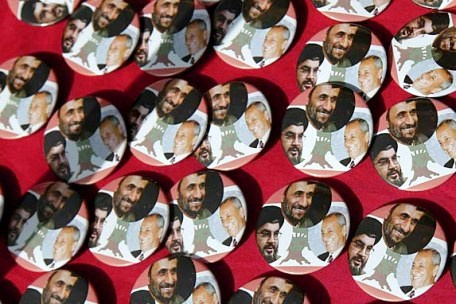How To Deal with the West through Public Diplomacy

The media have always been an influential tool on public opinion and a powerful instrument of the great countries. During the wars in Iraq and Afghanistan as well as in the Arab uprising, the media were the only source of news that would reveal the fate of the regional dictators. Perhaps if it were not for news channels like Al Jazeera that reported the latest development of the Tunisian and Egyptian uprisings on minute-by-minute basis, the revolutions would not have progressed so swiftly.
Iran has always been a target of the Western media. During recent months in which discussion of the topic of Iran’s nuclear program has become increasingly heated, the Western media have joined in on the commotion, making it more difficult to see past the jumble.
In an interview with IRD, Hassan Namakdoost talks about the gradual process of the Western media on conditioning public opinion for a war on Iran.
IRD: Are the Western media preparing public opinion for a war against Iran in order to reduce the bitterness of this act?
HN: The media cannot influence public opinion single handedly. Ultimately, what the media can do is to introduce certain topics and agendas to the public opinion domain. In other words, the media can bring certain issues to public attention but cannot tell the public what to think regarding those issues.
By using conventional and unconventional media tools, both parties have managed to increase the significance of Iran’s nuclear topic.
Of course, attention to Iran’s nuclear program is nothing new. For instance, if four years ago you were to ask a Japanese, American or a German person about Iran, most likely he or she would know about the issue of Iran’s nuclear program.
IRD: What do you mean by unconventional media tools?
HN: The way both parties’ mainstream media are covering the West and Iran’s nuclear dispute does not reflect standard media practices. What we are witnessing in regards to this topic is that the mainstream media of both sides have turned into propaganda machines. In such an atmosphere, conventional media operations are meaningless and instead a psychological warfare is taking place. Not only will this not contribute to the transparency of the situation, it will add to its complication. Furthermore, recovering from this process in not an easy task.
IRD: Are the majority of people convinced that Iran is seeking to build nuclear weapons?
HN: Iran will face a very difficult situation if the public consensus believes it is trying to arm itself with a nuclear weapon. Public opinion in the West, however, has not yet accepted an attack on Iran and the media are not able to persuade people that such an attack is wise. Several components must come together for the public to accept an attack on Iran.
IRD: Of the several components, are media one of the most important tools that could convince the public opinion that an attack on Iran is necessary?
HN: Political campaigns and propaganda through the media are among some of the necessary tools. Other components that add to the current conflict are: ineffective diplomatic relations and negotiations, delays, the IAEA’s and the UN Security Council’s internal processes, escalation of sanctions, both parties’ inappropriate and threatening political language, military rallying, media wars and Iran’s neighboring countries’ concerns. These are some of the factors that could create an unrecoverable condition.
Regarding the Western media, however, I could add that they are as yet hesitant to blatantly announce that Iran is aiming to build nuclear weapons. Initially, the media were only quoting politicians who said things like, “There is a chance that Iran is seeking to build nuclear weapons”. As debates escaladed and uncertainty persisted, those comments changed to “Iran is probably seeking to build nuclear weapons”. Today, however, Leon Panetta has announced, “Iran will soon be in possession of nuclear weapons,” therefore, the media broadcast that “There are no doubts that Iran is seeking to build nuclear weapons”. Again, I will emphasize that there are a set of tools at work here along side the mainstream media.
IRD: In your opinion, which of the above propositions regarding Iran and nuclear weapons is most popular in Western public opinion?
HN: I believe in the US the majority of the public believe that Iran is seeking to develop a nuclear weapon. This is not a good thing at all.
IRD: How did this escalation of Iran’s nuclear issue first begin in the media?
HN: The initial step was not difficult. Convincing the public that Iran may be seeking to develop nuclear weapons began by asking questions regarding Iran’s lack of transparency in its nuclear program. If you recall, in an interview with Iran’s channel 2, Mr. Javier Solana mentioned this issue several times. Furthermore, the price Iran is willing to pay for its peaceful nuclear program has added to that suspicion. Comments such as Iran’s desire to wipe Israel of the map were of course picked up by the West and used in the context of Iran’s nuclear issue.
Similar to Iran’s threat over the closing of the Strait of Hormuz, which resulted in creating a certain frame of mind on Iran, the programs of the Iranian mainstream media on its nuclear program issue could create a certain negativity in Western public opinion. I think the Iranian heads of state should closely consider the effects of the Iranian mainstream media in regards to the country’s nuclear issue, and to avoid using the media as a propaganda machine.

